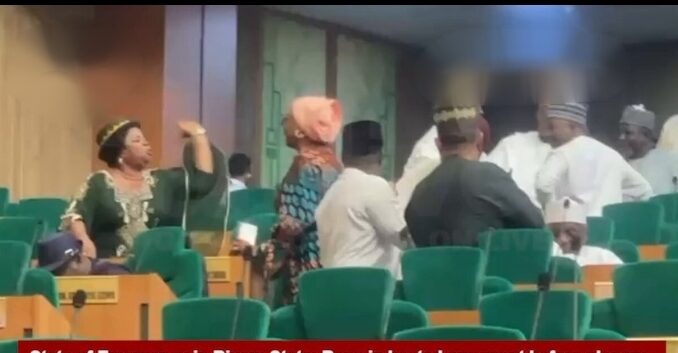
The hallowed chambers of the House of Representatives turned into a near battleground on Wednesday as lawmakers came close to exchanging blows in a fiery showdown over the brewing crisis in Rivers State. The bone of contention? A proposed state of emergency in the volatile oil-rich state and the controversial suspension of Governor Siminalayi Fubara.
The shouting match began as the legislators entered the chamber ahead of Wednesday’s plenary.
As of the time of filing this report, the House had entered into session.
Recall that President Bola Tinubu on Tuesday declared a state of emergency in Rivers following the prolonged political crisis in the South-South state.
The president also suspended Governor Siminalayi Fubara, his deputy, Ngozi Odu, and members of the state assembly for six months.
Meanwhile, The Nigerian Bar Association (NBA) has criticised President Bola Tinubu’s declaration of a state of emergency and removal of Governor Siminalayi Fubara of Rivers State.
In a statement on Tuesday, NBA President, Mazi Afam Osigwe (SAN) said the President does not have the constitutional power to remove an elected governor under a state of emergency.
“Any such action is an unconstitutional encroachment on democratic governance and the autonomy of state governments,” he said.
NBA therefore urged the National Assembly to reject any unconstitutional attempt to ratify the removal of the Rivers State Governor and other elected officials.
“The approval of a state of emergency must be based on strict constitutional grounds, not political expediency.”
NBA warned that suspending elected officials under emergency rule sets a dangerous precedent that undermines democracy and could be misused to unseat elected governments in the future.
The association also demanded that all actions taken in Rivers State strictly conform to constitutional provisions and Nigeria’s democratic norms while encouraging all stakeholders, including the judiciary, civil society, and the international community, to closely monitor the situation in Rivers to prevent unconstitutional governance and abuse of power.
Leave a Reply